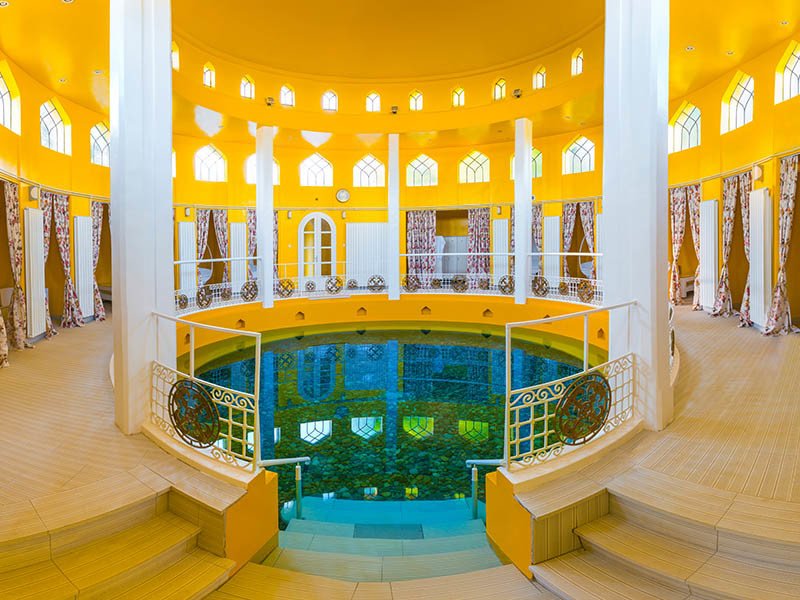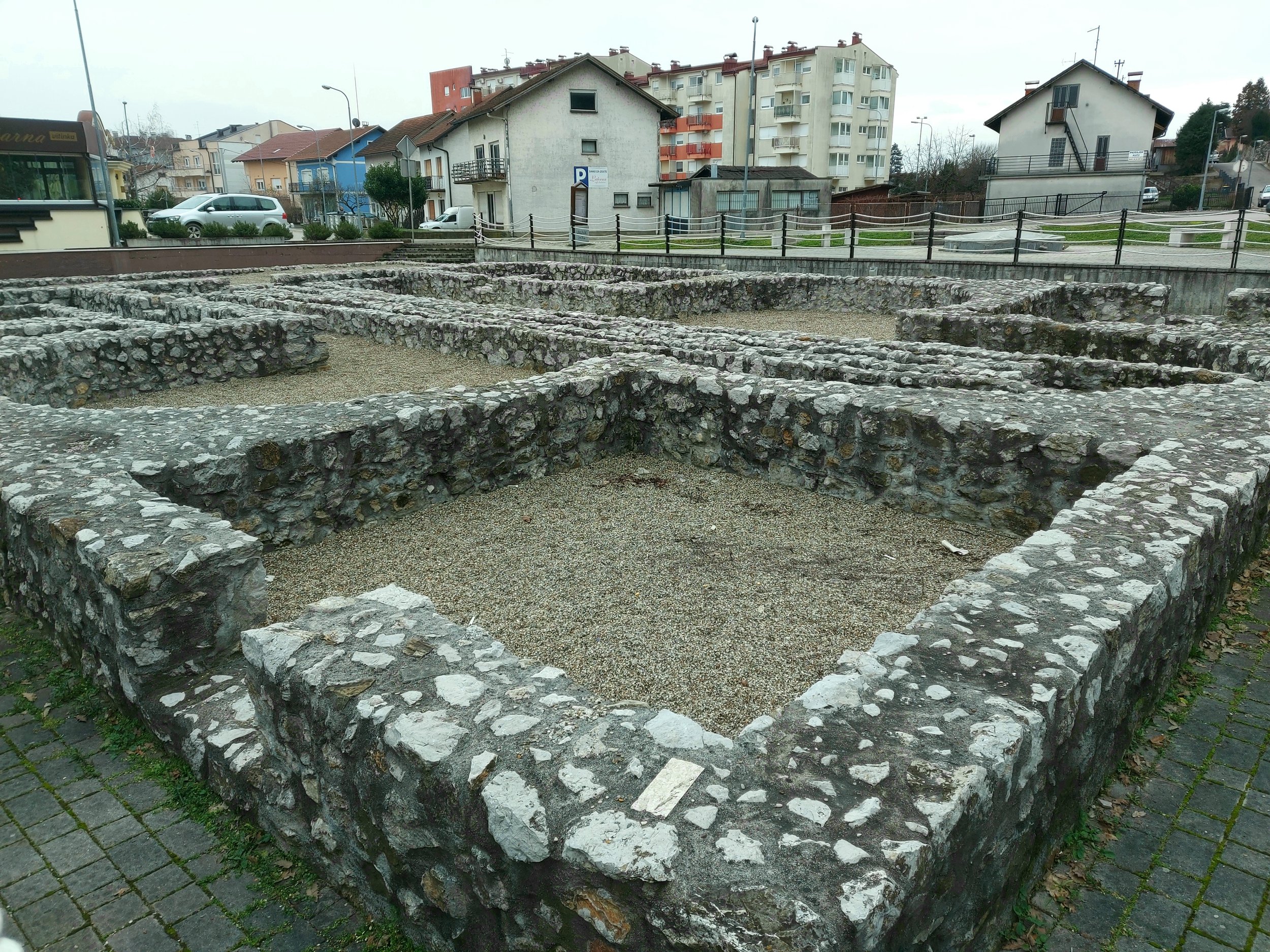Laktaši // When in Laktaši, Do as the Romans
Terme Laktaši // © Terme Laktaši
Years ago, I read that the sound of coins hitting the floor is the sound to which humans react quickest. There may be some hyperbole in that, not to mention a healthy amount of the old “why are humans so greedy?”, but I’ve never bothered to look deeper into it. My head turns when coins hit the floor, I know that much.
On that same train of thought, whenever a car beeps its horn, I automatically assume that the beeper is attempting to get my attention. I never see who the driver is, of course. One, because the car in question is usually going at least 30mph, and two, I can’t see for shit. A strange turn of phrase, the old “…for shit”, but it probably sits well there.
What’s more, why the hell would anyone in Laktaši be looking to get my attention? Funnily enough, I do know people in Laktaši, but they spend most of their time in Banja Luka. Besides, if we were to see each other in Laktaši, it would be by design.
These were the musings that ran through my head as I sulked from the side of the road back towards the spa. I had spent the previous three hours on a bus from Zagreb, alternating between desperately needing the toilet and being eternally thankful that I wasn’t travelling in the opposite direction, such were the queues at the border. Laktaši is a noted stop on the Pula to Prijedor route, but it also happens to be a small village without a station, the sort which drivers routinely speed through with no desire to stop. That is what happened here, and I was forced to muddle my way up to the driver to remind him that I was getting off in Laktaši, a town we’d just left. He apologised, profusely, and immediately stopped the bus and let me out. Sure, I’d have to walk a couple of miles back, but them’s the breaks.
Absolute relaxation awaited me, so it wasn’t so bad. Laktaši is synonymous with a history of wellness, thanks to the thermal waters here and the Roman dedication to spending as much time in those waters as possible. Those famous conquerors did the business here in the long long ago, establishing a healthy collection of baths and spas and other things that made them feel good after all that fightin’. One such bath was discovered in Laktaši in 1998, a complex that dates to somewhere between the 1st and 4th centuries, if you’ll forgive such a long timespan. I made an immediate beeline for the remains upon arriving, eager to drown myself in the history of wellness. Not literally, obviously, that would be silly.
These were no ordinary baths either. The Romans devised a highly complex system of heating to ensure maximum enjoyment. The heated air was pumped through channels in the walls, and the network was divided up to provide something for everyone. There were rooms with hot and cold water, hot air rooms, special spots for massages, exercise and conversation. If you wanted to relax in Roman Laktaši, you were going to do it here.
All that remains now is the outline, but that is enough to spark the imagination. Not too much, obviously, that would lead to images of dudes missing togas, but you get the point.
Roman Bath remains in Laktaši // © John Bills
This wasn’t Roman Laktaši, however, this was 21st-century Laktaši. I was staying in the town’s eponymous wellness centre, and I was eager to engage in a little bit of lying down while the requisite qualified individual gave my back a good rubbing. As the age-old saying goes, when in Laktaši, do as the Romans. If it gave me time to consider the lengthy history of the town, even better.
As with most massages, it all began with oil and a general covering of the back. Sure, it was getting a little too relaxing for my tastes, but judging a massage by the first few moments is a fool’s game, The first few moments of Laktaši are impossible to quantify, at least in any way that makes sense on a website more interested in accessibility than academia. As with many places, there is evidence that people have been living here for ages, and it was the aforementioned Romans who really made their mark. Alas, such things can’t and don’t last forever.
The masseuse had moved their focus to my left side, particularly the shoulders, eschewing the initial relaxation in favour of some seriously intense gripping. Yes, it hurt, but it should, the whole point of these things is to smash scar tissue and shock your body into compliance. The somewhat timid early start had given way to aggression. With the Romans out the way, Laktaši followed suit, changing hands in the usual regional style, passing through the care (obviously the wrong word, but I’m sticking with it) of the Goths, the Avars and Slavic tribes before the Ottomans arrived and did what they tended to do in these parts, namely set up shop.
I’d lost track of time, but it felt as though the masseuse was setting up shop in my left shoulder, using thumb, elbow and palm to untie the knots that had built up over years of sitting like a hunchback. My posture isn’t great, my posture isn’t even good, and decades of slouching had created a reliance on that very same bad posture for normality. Dragging my shoulders to a more natural position leaves me feeling like an imposter. The Austrians eventually came in and replaced the Ottomans, bringing a wide range of nationalities with them. Most notable among these were the Italians, themselves displaced by flooding in the northern part of their own lands. They wanted a new life, a new place to cultivate produce. They chose Laktaši, and by 1921 there were more than 500 Italians in town. Many descendants of those first arrivals remain in Laktaši today.
A church. I really didn’t take many photos in Laktaši // © John Bills
The intensity of the massage continued to increase. I could feel my back entering a state of not quite nirvana but definitely something better than the mess it was when I wandered in, however many minutes earlier. The right side of my back was being fixed now, with less violence but equal success. That’s the better side, you see. The mixture of nationalities allowed Laktaši to develop quickly in the early years of Yugoslavia, but the post-World War II period wasn’t kind to the town. It was forgotten in its own sort of way, stagnating, neglected. You can draw your own conclusions about my posture there if you so decide.
Oh God, my legs. My poor, poor calves.
Any thoughts of Laktaši and its history evaporated in a succession of grimaces and deep breathing. My calves are tight at the best of times, and a masseuse beating the shit out of them is simultaneously the best and worst of times. Necessary, obviously, and the shock therapy that they were undergoing was all short-term pain and long-term gain. I hope so, anyway. In the 21st century, Laktaši finds itself in need of something similar, albeit with less oil and more economic innovation.
The massage ended. I gathered my senses and trudged back towards my room, free of a hefty amount of tension and ready for the now-customary post-massage nap.


